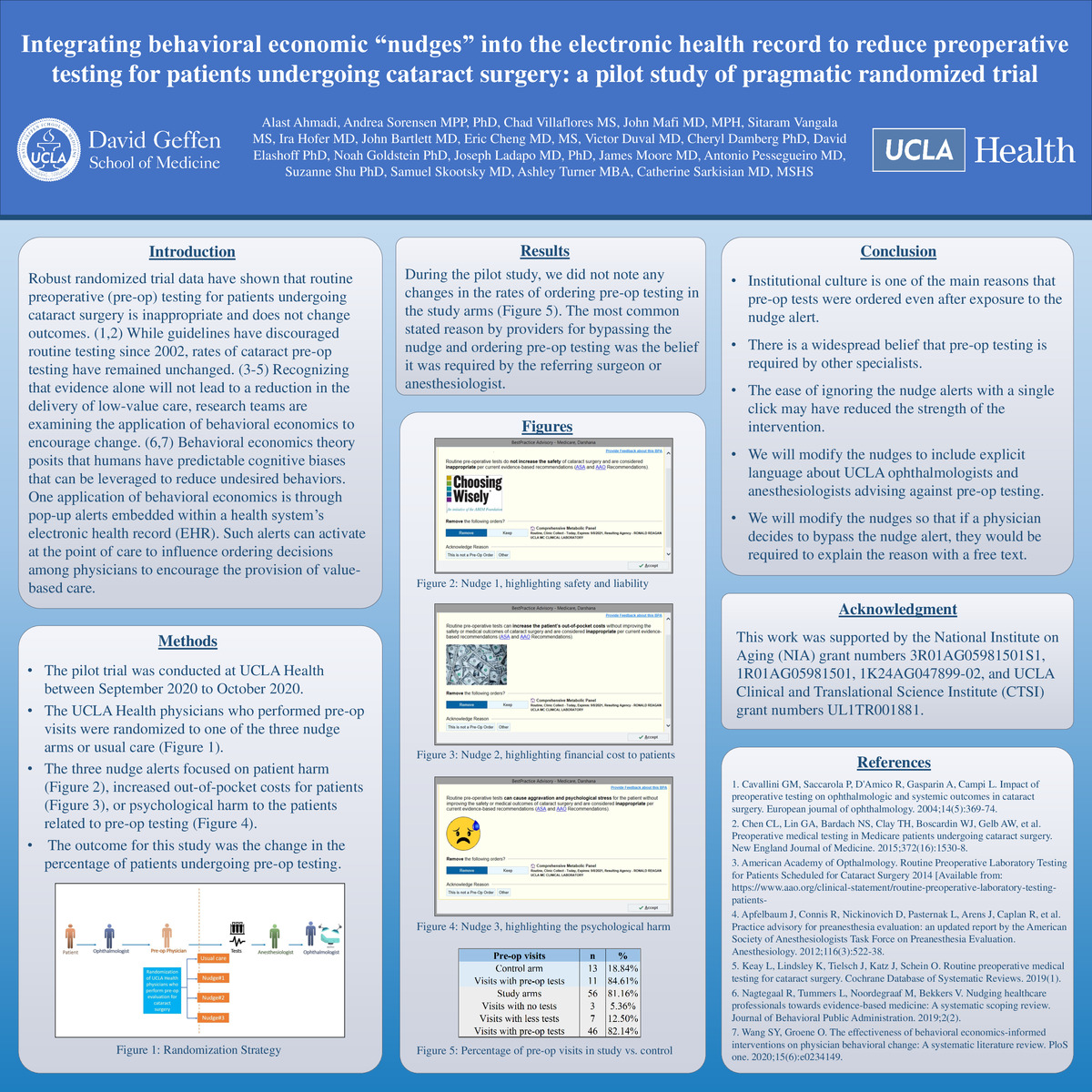-
Author
Alast Ahmadi -
Co-author
Alast Ahmadi, Andrea Sorensen MPP, PhD, Chad Villaflores MS, John Mafi MD, MPH, Sitaram Vangala MS, Ira Hofer MD, John Bartlett MD, Eric Cheng MD, MS, Victor Duval MD, Cheryl Damberg PhD, David Elashoff PhD, Noah Goldstein PhD, Joseph Ladapo MD, PhD, James Moore MD, Antonio Pessegueiro MD, Suzanne Shu PhD, Samuel Skootsky MD, Ashley Turner MBA, Catherine Sarkisian MD, MSHS
-
Title
Integrating behavioral economic “nudges” into the electronic health record to reduce preoperative testing for patients undergoing cataract surgery: a pilot study of pragmatic randomized trial
-
Abstract
BACKGROUND: Robust randomized trial data have shown that routine preoperative (pre-op) testing for patients undergoing cataract surgery is inappropriate and does not change outcomes. (1,2) While guidelines have discouraged routine testing since 2002, rates of cataract pre-op testing have remained unchanged. (3-5) Recognizing that evidence alone will not lead to a reduction in the delivery of low-value care, research teams are examining the application of behavioral economics as a way to encourage change. (6,7) Behavioral economics theory posits that humans have predictable cognitive biases that can be leveraged to reduce undesired behaviors. One application of behavioral economics is through pop-up alerts embedded within a health system’s electronic health record (EHR). Such alerts can activate at the point of care to influence ordering decisions among physicians to encourage the provision of value-based care.
METHODS: To evaluate the impact of an interdisciplinary EHR intervention that is informed by behavioral economics theory, this pilot pragmatic randomized trial was conducted at UCLA Health between September 2020 and October 2020. We randomized all UCLA Health physicians who performed pre-op visits during the study period to one of the three nudge arms or usual care. These three nudge alerts were triggered when a physician attempted to order a pre-op test, and address (1) patient harm, (2) increased out-of-pocket costs for patients, or (3) psychological harm to the patients related to pre-op testing. The outcome for this study was the change in the percentage of patients undergoing pre-op testing.
RESULTS: During the pilot study, 69 pre-op visits were identified with 56 in the study arms and 13 in the control arm. We did not note any change in the rates of ordering pre-op testing among physicians in the study arms compared to the control (82% vs. 84%). The most common stated reason by providers for bypassing the nudge and ordering pre-op testing was the belief it was required by the referring surgeon or anesthesiologist.
DISCUSSION: In this pilot study, we found that institutional culture was a primary reason that pre-op tests were ordered even after exposure to the nudge alert. There is a widespread belief that pre-op testing is required by other specialists. Additionally, the ease of ignoring these alerts with a single click may have reduced the strength of the intervention. These findings will inform necessary modifications in the design of EHR nudges for the upcoming pragmatic randomized trial. We will modify the nudges to include explicit language about UCLA ophthalmologists and anesthesiologists advising against pre-op testing, and including reference to UCLA internal guidelines. We will also modify the nudges so that if a physician decides to bypass the nudge alert, they would be required to explain the reason with a free text.
REFERENCES:
1. Cavallini GM, Saccarola P, D'Amico R, Gasparin A, Campi L. Impact of preoperative testing on ophthalmologic and systemic outcomes in cataract surgery. European journal of ophthalmology. 2004;14(5):369-74.
2. Chen CL, Lin GA, Bardach NS, Clay TH, Boscardin WJ, Gelb AW, et al. Preoperative medical testing in Medicare patients undergoing cataract surgery. New England Journal of Medicine. 2015;372(16):1530-8.
3. American Academy of Opthalmology. Routine Preoperative Laboratory Testing for Patients Scheduled for Cataract Surgery 2014 [Available from: https://www.aao.org/clinical-statement/routine-preoperative-laboratory-testing-patients-
4. Apfelbaum J, Connis R, Nickinovich D, Pasternak L, Arens J, Caplan R, et al. Practice advisory for preanesthesia evaluation: an updated report by the American Society of Anesthesiologists Task Force on Preanesthesia Evaluation. Anesthesiology. 2012;116(3):522-38.
5. Keay L, Lindsley K, Tielsch J, Katz J, Schein O. Routine preoperative medical testing for cataract surgery. Cochrane Database of Systematic Reviews. 2019(1).
6. Nagtegaal R, Tummers L, Noordegraaf M, Bekkers V. Nudging healthcare professionals towards evidence-based medicine: A systematic scoping review. Journal of Behavioral Public Administration. 2019;2(2).
7. Wang SY, Groene O. The effectiveness of behavioral economics-informed interventions on physician behavioral change: A systematic literature review. PloS one. 2020;15(6):e0234149.
-
College
PCC
-
Zoom
-
PDF

